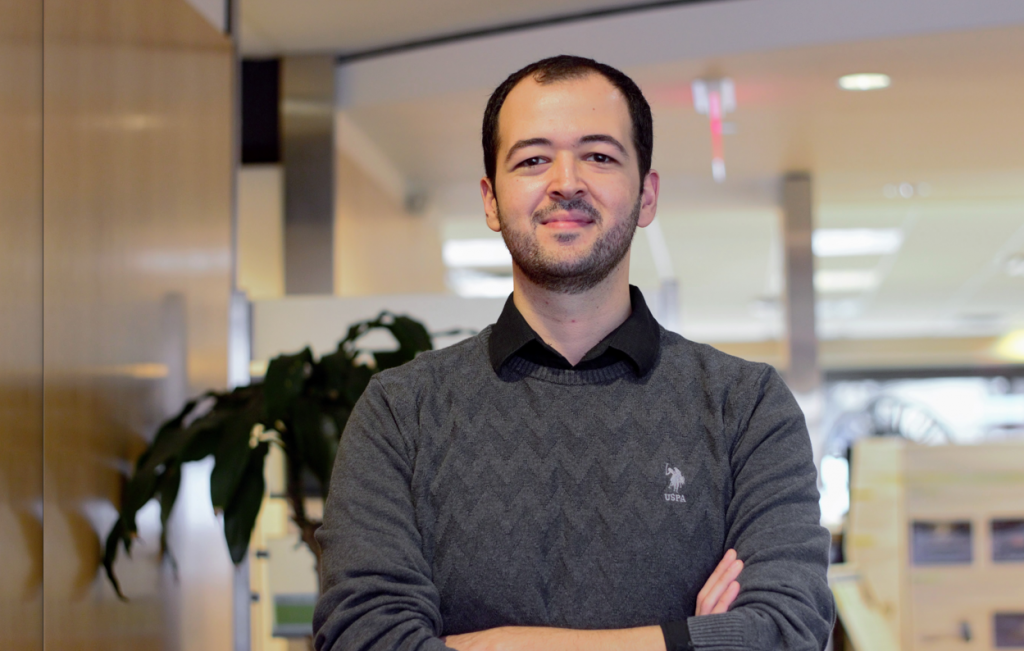WIMTACH Student Profile: Emre Yurderi

Emre Yurderi is big on challenging himself. Although he holds a Bachelor’s degree in Statistics and a Master’s Degree in Big Data Analytics, he is still hungry for an opportunity to expand his knowledge in the Data Science field. As a result, in January 2023, he enrolled in the Artificial Intelligence program at Centennial College and later, applied to become a Student Researcher at WIMTACH. “It was a great opportunity for me while I was studying,” he said.
Joining WIMTACH in August 2023, Emre initially assisted the research team with the development of a new start-up company’s project and now, he is also assisting the team with another project of a multi-national company. His role for both project collaborations revolve around data analysis work. As a Student Researcher, he is encouraged to research academic articles, work on data analysis and processing, build models and prepare interpretations, gaining a uniquely in-depth mentorship experience that is not always accessible for students.
Emre is certain that the opportunity to get hands-on experience at WIMTACH will help him to get a job. He points to the ongoing request from employers for candidates with tangible Canadian Artificial Intelligence experience, as a major reason why his months long internship is important. Since the start of his internship, he has been able to confidently assert his technical skills with Python and data analysis libraries and packages. Also, he is comfortable with using Pandas, Scikit-learn, TensorFlow, NumPy along with other libraries used in data analysis. For Emre, the most significant experience he has gained so far is being a part of a project from start to finish and using new methodologies. “Now I have a chance to sharpen my skills; also, I learned a lot of new methods in Python that I haven’t used before,” he said.
Emre notes that he sees a difference between working on his own independent projects versus a WIMTACH project. For instance, he explained that problems are usually hidden in a client’s a data set. In such a scenario, Emre finds the problem in the data set and performs a test to determine if he has correctly located the problem, before developing a solution. Working at WIMTACH armed him with this knowledge. Additionally, his improved understanding of generative scientific data sets using generative adversarial networks (GAN) synthesizers in deep learning is an example of how he has been able to expand his knowledge during this internship.
Overall, his internship has enabled him to learn a lot. He is now able to read and understand data analysis procedures, configure parameters based on requirements, and finally, interpret the results. To ensure that he was able to understand this procedure and produce meaningful work, under the guidance of Centennial College faculty members, he studied academic articles about data analysis. He centered his studies on understanding how the models worked, trying to find the ways that models can be used in WIMTACH projects. He also relied on forums like Stack Overflow and other websites and ChatGPT. Despite the complicated nature of this process, he found the entire procedure to be quite appealing and a reprieve for the tedium of the routine he had come to expect when he was originally working in Human Resources as an Organizational Development Lead. “For me [working with GAN model] was an invaluable experience because even though it is already in use in the industry, I don’t think … many [students] had this opportunity to experience this method in their education,” he said.
Describing his progression, he noted that he was newly introduced to this data analysis process because of his involvement with one of the projects. He studied research papers from similar fields conducted before, analyzed the requirements for the current project, and examined the project dataset. Subsequently, he identified the project’s needs and addressed limitations by generating synthetic data using a deep-learning GAN model. This approach helped the team to overcome the constraints of the original dataset and facilitate efficient model training. In the end, the results were compared, demonstrating that the expanded dataset exhibited superior efficiency compared to the original dataset. “While we were doing these steps, we’d seen that even though the client [may] feel that they can’t have thousands of data points due to the limited sources … we’ve seen that when we generate our own data set, based on original data points, actually we can still have [efficiency], we can still have significant results by using that synthetic data set,” he said.
Since Emre was able to be part of every process in the development of deep learning models for both projects, he feels that it will give him an edge when he is ready to begin job searching after graduating in April. Participating in a real-world project with a client helped him to sharpen some of the skills he garnered from working in Human Resources and afforded him a new skill: the capability to work with academic articles. Reflecting on the final meeting of the first phase of a project, he noticed that the work of the team was well received and impacted the clients’ intentions to continue on a partnership. “I felt relieved and also I felt confidence,” he said.
He hopes to eventually use all this experience to get a Data Scientist or Data Analysis role. “I think [after] working on a data set and working on a project … I feel more confident now than before on working on data analysis, on machine learning for AI specifically.”
For more stories, please visit: https://wimtach.centennialcollege.ca/news/


0